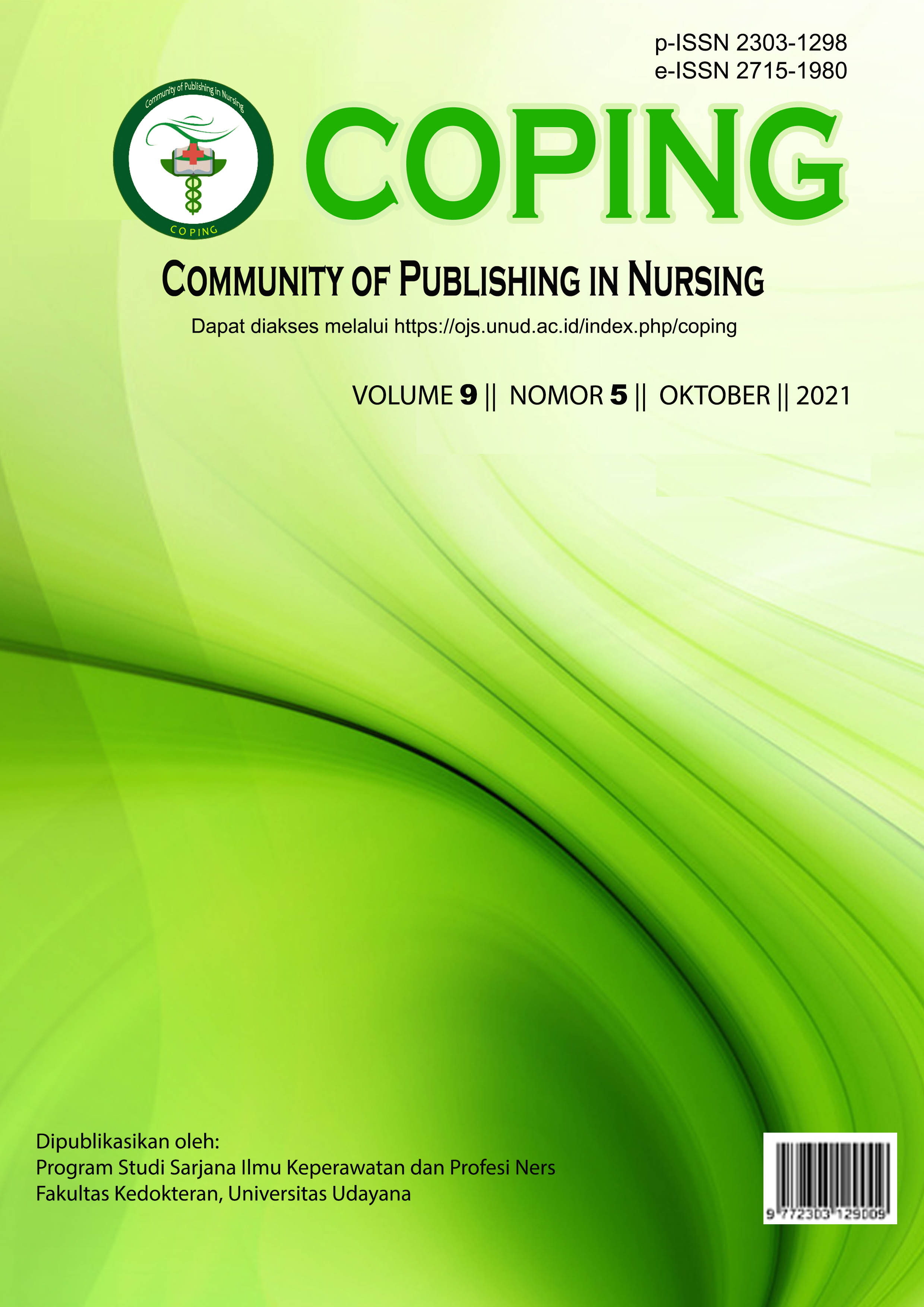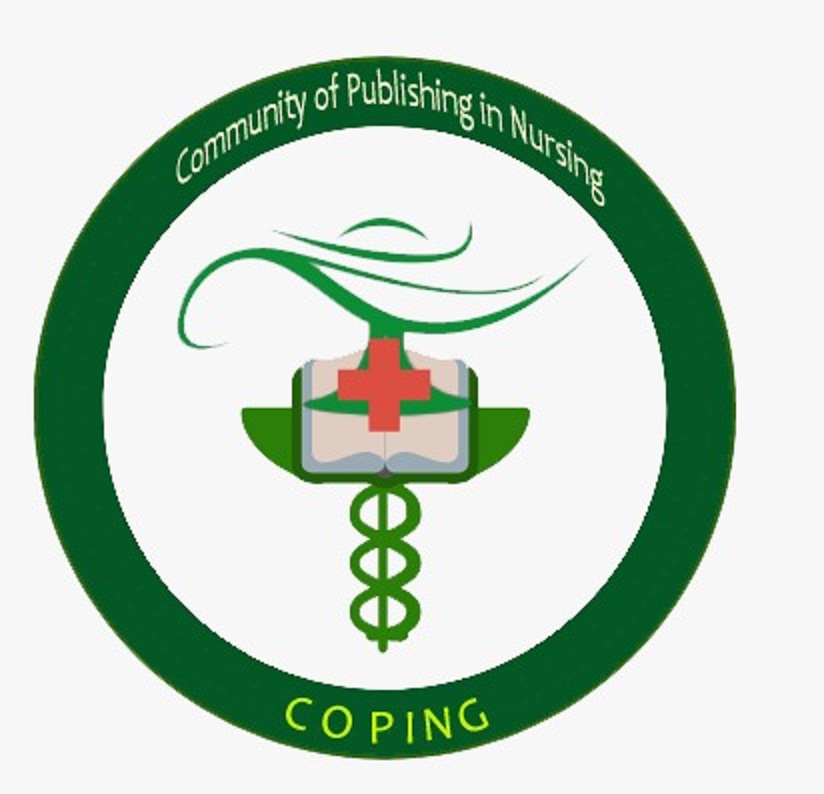GAMBARAN PARENTAL SELF EFFICACY PADA PEKERJA WISATA DENGAN ANAK USIA SEKOLAH YANG MENGIKUTI PEMBELAJARAN DARING
Abstract
The Covid-19 pandemic has an economic impact due to a decrease in the amount of tourists visiting Bali. The Covid-19 pandemic has also impact in the implementation of online learning. Online learning for school age children still has accompanied by parents. This change in situation has created a challenge for tourism worker parents to raise their children. One factor that influences parenting is parental self-efficacy (PSE). PSE can impact to child development, parental mental health, and parent-child relationship. The aims of this study is to describe parental self-efficacy among tourism workers with school age children who follow online learning. The design of this research was descriptive quantitave with cross-sectional approach. The sample amounted of 154 tourism worker parents with school age children in SD Negeri 1 Beraban, SD Negeri 3 Beraban, and SD Negeri 4 Beraban who were selected by using purposive sampling. The results of this study showed that the school age children of tourism worker parents had an average age of nine years old, majority male sex, and in 2th, 3th, and 4th grade. Tourism worker parents in this study had an average age of 39 years old, majority male sex, last education SMA, have income <Rp. 2.600.000, and have two children. The mean value of PSE was 100,48 with standard deviation of 9,253. The lowest PSE score was 77 and the highest score was 127. The tourism worker parents majority had a low PSE which was 53,9%. Future research are expected to analyze factors related to PSE, provide interventions to improve PSE, and conduct qualitative research to depth-exploration about PSE.
Downloads
References
Antawati, D. I., & Murdiyani, H. (2013). Dinamika psikologis pembentukan parenting self efficacy pada orang tua penyandang tunarungu. Jurnal Psikologi Teori & Terapan, 4(1), 31-47.
Apriani, I., & Risnawaty, W. (2020). Self efficacy among full-time working mothers in Jabodetabek. Advances in Social Science, Education, and Humanities Research, 478, 508-513.
Aulya, A., Ilyas, A., & Ifdil. (2016). Perbedaan perilaku agresif siswa laki-laki dan siswa perempuan. Jurnal EDUCATIO, 2(1), 92-97.
Biehle, S. N., & Mickleson, K. D. (2011). Personal and co-parent predictors of parenting efficay across the transition parenthood. Journal of Social and Clinical Psychology, 30(9), 985-1010.
Brown, S. M., Doom, J.R., Lechuga-pe, S., Watamura, S. E., & Kopples, T. (2020). Child abuse and neglect stress and parenting during the Covid-19 pandemic. Child Abuse & Neglect.110(2), 1-14. https://doi.org/10.1016/j.chiabu.2.020.104699
Budiyanti, E. (2020). Dampak virus corona terhadap sektor perdagangan dan pariwisata di Indonesia. Info Singkat, 12(4), 19-24.
Castillio, J. T., & Fenzl-crossam, A. (2010). The relationship between non-marital fathers social corespondence, Child and Social Work, 15, 66-76. https://doi.org/10.1111/j/1365-2206.2009.00644.x
Centers for Disease Control and Prevention (CDC). (2020). Coronavirus. Diakses melalui http://www.cdc.gov/coronavirus/types.html
Coleman, P. K., & Karraker, K.H. (2000). Parenting self-efficacy among mothers of school-age children : conceptualization, measurement, and correlates. Family Relations, 13-24.
Crinic, K., & Ross, E. (2017). Parenting stress and parental efficacy. Spinger International Publishing. 263-284. https://doi.org/10.1007/978-3-319-55376-4
Dewi, W. A. F. (2020). Dampak Covid-19 terhadap implementasi pembelajaran daring di sekolah dasar. Jurnal Ilmu Pendidikan, 2(1), 55-61.
Edendijk, J. J., Groeneveld, M. G., Bakermans-Kranenburg, M. J., & Mesman, J. (2016). Gender-differentiated parenting revisited : metaanalysis reveals very few differences in parental control of boys and girl. PLoS ONE, 1 (2). https://doi.org/10.1371/journal.pone.0159193
Gambin, M., Prus, M. W., Sekowski, M., Cudo, A., Pisula, E., Kiepura, E., Kiziukiweicz, J. B., & Kmita, G. (2020). Factors related to positive rexperiences in parental child relationship during the Covid-19 lockdown: The role of empathy, emotion regulation, parenting self efficacy, and social support. https://doi.org/10.31234/osf.io/yht/qa
Gavita, O. A. (2014). You are such a bad child, appraisals as mechanisms of parental negative and positive affect. The Journal of General Psychology, 141(2), 113-129.
Hapsari, S. M., Sugito, & Fauziah, P.Y. Parent’s involment in early childhood education during the Covid-19. Jurnal Pendidikan Progresif, 10(2), 298-311. https://doi.org/10.23960/jpp.v10.i
Indrasari, S. Y., & Affiani, L. (2018). Peran persepsi orang tua dan strategi pengasuhan terhadap parentaing self-efficay. Jurnal Psikologi Sosial, 16(02), 74-85. https://doi.org/10.7454/jps.2018.8
Jones, T. L., & Prinz, R. J. (2005). Potential roles of parental self efficacy in parent and child adjustment : A riview. Clinival Psychology Riview, 25, 341-363. https://doi.org/10.1016/j.cpr.2004.12.00.4
Juntitla, N., Aromaa, M, Rautava, P., Jorma, P., Hanele, L. (2015). Measuring multidimensional parental self-efficacy of mothers and fathers of children. Interdiciplinary Journal of Applied Family Studies, 64, 665-680. https://doi.org/10.1111/fare.12161
Kementerian Kesehatan Republik Indonesia. (2020). Situasi Terkini Perkembangan Novel Coronavirus (Covid-19). Jakarta : Kemenkes RI.
Listyaningsih, D., & Nirmasari, C. (2019). ANalisis faktor yang berhubungan dengan parenting self efficacy pada periode awal postpartum di Puskesmas Bergas Moneca. Jurnal Ilmu Kesehatan Arum Salatiga, 3(2).
Mafaza, Alfara, H., & Purba, Y. A. (2017). Parenting self efficacy pada orang tua dengan tuna netra. Jurnal Ilmu Perilaku, 1(2), 110-124.
Melliana, R., & Purba, Y. A. (2020). The impact of Covid-19 layoffs and income in Indonesia. Jurnal Kependudukan Indonesia, 2(2), 43-48.
Mouratidou, K., Karamavrou, S., Karatza, S., &Schillinger, M. (2019). Agressive and socially behaviors in kindergarten and elementary school students: A comparative study concerning gender, age, and geographical background of childrend in Northem Greece. Social Psychology of Education. https://doi.org/10.1007/s11218-019-09536-z
National Academies of Sciences. (2016). Parenting Matters : Supporting the Parents of Chidren Ages 0-8. Washington DC : National Academies Press (US).
Nicolaa, M., Alsafib, Z., Sohrabic,C., Kerwan, A., Al-Jabird, A., Iosifidisc, C., Agahae, M., & Agha, R. (2020). The socio-economic implications of the coronavirus pandemic (COVID-19) : A riview. International Journal od Surgery, 78, 185-193. https://doi.org/10.1016/j.ijsu.2020.04.018
Pangestu, I. D. (2020) Parenting self efficacy ayah dan ibu pada pasangan suami istri yang menikah dini. Cognicia, 8(2), 262-276.
Peraturan Pemerintah Republik Indonesia Nomor 21 Tahun 2020 Pembatasan Sosial Berskala Besar dalam Rangka Percepatan Penanganan Corona Virus Disease 2019 (Covid-19. 31 Maret 2020. Lembaran Negara Republik Indonesia Tahun 2020 Nomor 91. Jakarta.
Putri A. F. (2019). Pentingnya orang dewasa awal menyelesaikan tugas perkembangannya. SCHOULD: Indonesia Journal of School Counseling, 3(2), 35-40.
Rakhmawati, I. (2015). Peran keluarga dalam pengasuhan anak. Konseling Religi : Jurnal Bimbingan Konseling Islam, 6(1), 1-18.
Radanovic, A., Micic, I., Pavlovic, S., &Krstic, K. (2020). Pandemic parenting : predictors of quality of parental pandemic practices during Covid-19 locdown in Serbia. Psihologija, 1, 1-23. https://doi.org/102298/PSI/200731040R.
Salonen, A. H., Kaunonen, M., Paivi, A. K., Jarvepaa, A. L., Isoaho, H., & Tarrka, M. T. (2009). Parenting self efficacy after childbirth. Journal of Advance Nursing, 65(11), 2324-2336. https://doi.org/10.1111/j.1365-2648.2009.00980.x
Sevigny, P. R., & Lotzenhiser, L. (2010). Predictors of parenting self efficacy in mother and father of toddler. Child : Care, Health, and Development, 36(2), 179-189. https://doi.org/10/1111/j.1365-2214.20009.00980.x
Shorey, S., Chan, S. W., & Seng, Y. (2014). Predictors of maternal parental self efficacy among primiparas in the early postnatal period. Western Journal of Nursing Research, 1-19. https://doi.org/10.1177/0193945914537724
Yuan, S., Weiser, D. A., & Fischer, J. L. (2016). Performace : A comparison of European American and Asian American college students. Social Psychology of Education. https;//doi.org/10.1007/s11218-015-9330-x
World Health Organization (WHO). (2020). Coronavirus desease (Covid-19). Diakses melalui http://who.int/tableableChartType=heat.







